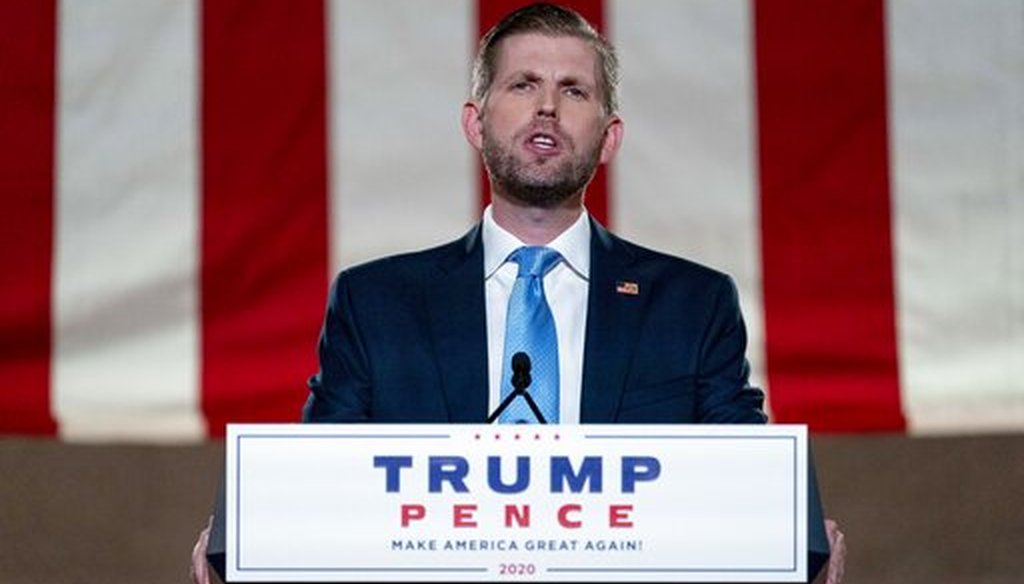Stand up for the facts!
Our only agenda is to publish the truth so you can be an informed participant in democracy.
We need your help.
I would like to contribute

Eric Trump, the son of President Donald Trump, tapes his speech for the Republican National Convention from the Andrew W. Mellon Auditorium in Washington on Aug. 25, 2020. (AP/Harnik)
If Your Time is short
-
Speakers at the Republican National Convention exaggerated President Donald Trump’s progress toward getting the U.S. out of “endless wars” in the Middle East.
-
The Pentagon said there are currently more than 8,000 U.S. forces in Afghanistan, about 5,200 in Iraq and about 500 in Syria, with plans for future withdrawals.
-
Experts said the “endless wars” haven’t ended, peace in the Middle East hasn’t been achieved, and the U.S. presence in the region hasn’t significantly slimmed under Trump.
Speakers at the Republican National Convention hailed President Donald Trump as an anti-war leader who has saved the U.S. from a string of "endless wars" in the Middle East.
Sen. Rand Paul of Kentucky, for example, celebrated Trump for "bringing our men and women home." Eric Trump claimed that his father has achieved "peace in the Middle East. Never-ending wars were finally ended."
The White House and Trump campaign did not respond to our inquiries. But experts in foreign policy told us the "endless wars" are not over, and Middle East peace has not been achieved.
"I will give Trump credit for not starting new wars. That is true, and no mean feat," said Michael O’Hanlon, a senior fellow and the director of research in foreign policy at the Brookings Institution. "But the U.S. footprint in the broader Middle East remains very similar to what he inherited. He hasn’t really ended any forever wars."
It’s difficult to determine how U.S. forces are distributed in the Middle East, in part because of changes that Trump’s former Defense Secretary James Mattis made to reduce transparency.
In February, the U.S. signed a deal with the Taliban that paved the way for U.S. troops to gradually withdraw from Afghanistan if the group met certain conditions. Before that, Trump ordered the withdrawal of U.S. troops from Syria in December 2018 and again in October 2019.
More recently, the U.S. helped broker a deal normalizing relations between Israel and the United Arab Emirates.
A Pentagon spokesperson said that U.S. force levels in Afghanistan are currently in the mid 8,000s and should be reduced to below 5,000 people by the end of November. There are about 500 troops in Syria and 5,200 in Iraq, the spokesperson said.
The current levels are not a significant change from what Trump inherited, experts said. In Afghanistan, for example, there were roughly 8,400 troops at the time of Trump’s inauguration. That number ballooned to around 14,000 at one point during Trump’s term after he sent in more forces in 2017.
"The overall striking thing is the relative continuity, despite Trump’s bombast and disdain for alliances," said O’Hanlon.
In Syria, where some troops have been removed under Trump, peace has not been achieved. CNN reported that U.S. troops and their allies in Syria exchanged fire with pro-Syrian regime forces as recently as mid August, when they were shot at in eastern Syria.
In Iraq, the top American military commander in the Middle East has said there are plans to pare down the U.S. forces in the coming months, but a long-term presence will stay to deal with Islamic extremists and Iranian influence in the country, the New York Times reported.
In December 2016, the Pentagon reported about 199,000 total active duty troops overseas, compared with about 171,025 in June under Trump — but that difference is partly because the department under Mattis stopped publishing troop counts for countries with ongoing operations, such as Syria, Iraq and Afghanistan.
The Washington Post reported in July that while Trump has tried to identify countries from which he can bring home troops by Election Day, "the overall total of those serving abroad is believed to have slightly increased since Barack Obama left office."
The number of troops on the ground in the region doesn’t account for all U.S. military efforts, said Christopher Preble, co-director of the Atlantic Council’s New American Engagement Initiative. He cited Trump’s touting of American military might, increases to the nation’s defense budget, and continued use of airstrikes.
"The friends and families of the dead would surely dispute that he’s ended U.S. wars," Preble said, noting that Trump also changed the rules for reporting civilians killed by U.S. airstrikes.
The 2018 withdrawal from the Iran deal and January killing of top Iranian military leader Gen. Qassem Soleimani have "also contributed to rising tensions in the Persion Gulf," Preble said.
The U.S. maintains a presence in other Middle Eastern countries.
As of June, there were 4,469 total U.S. forces in Bahrain, 295 in Egypt, 119 in Israel, 115 in Jordan, 2,285 in Kuwait, 28 in Lebanon, 25 in Oman, 632 in Qatar, 813 in Saudi Arabia, 1,742 in Turkey, 232 in the United Arab Emirates and 4 in Yemen, according to the Defense Department's public data, which omits counts for Syria, Iraq and Afghanistan.
Those numbers include active duty personnel, national guard and reserve personnel, and civilian personnel. They do not include temporary forces or classified special forces.
Our Sources
Republican National Convention, Aug. 25
U.S. Department of Defense, "DOD Personnel, Workforce Reports & Publications," accessed Aug. 26, 2020
CNN, "Fact Check: Second night of RNC riddled with dishonesty as Melania Trump appeals for 'total honesty,'" Aug. 26, 2020
The New York Times, "Fact-Checking Night 2 of the Republican National Convention," Aug. 26, 2020
The Washington Post, "Fact-checking the first night of the 2020 Republican National Convention," Aug. 24, 2020
CNN, "US troops in Syria and allies exchanged fire with pro-Syrian regime forces," Aug. 17, 2020
The White House,"President Donald J. Trump Has Secured a Historic Deal Between Israel and the United Arab Emirates to Advance Peace and Prosperity In the Region," Aug. 13, 2020
The New York Times, "Top General in Middle East Says U.S. Troop Levels Will Drop in Iraq and Syria," Aug. 12, 2020
The Washington Post, "Trump is determined to bring home U.S. military forces from somewhere," July 21, 2020
BBC News, "Afghan conflict: US and Taliban sign deal to end 18-year war," Feb. 29, 2020
The Los Angeles Times, "Column: Trump’s brand of war is killing more civilians than before," Sept. 8, 2019
Airwars, "Airwars six monthly assessment: January-June 2019," August 2019
Cato Institute, "Trump’s Crazy Military Budget," March 11, 2019
The New York Times, "Trump Revokes Obama-Era Rule on Disclosing Civilian Casualties From U.S. Airstrikes Outside War Zones," March 6, 2019
NPR, "Pentagon Questioned Over Blackout On War Zone Troop Numbers," July 3, 2018
Politico, "Trump will increase troops in Afghanistan. Here’s how U.S. troop levels have changed since 2001," Aug. 21, 2017
PolitiFact, "Fact-checking 22 claims from Donald Trump's Axios interview," Aug. 4, 2020
PolitiFact, "Trump’s pledge to renegotiate Iran deal remains at standstill as election nears," July 15, 2020
PolitiFact, "Trump exaggerates spending on U.S. military rebuild," Jan. 10. 2020
PolitiFact, "McGurk right that Trump has sent 14,000 troops to Middle East since May," Oct. 22, 2019
PolitiFact, "Donald Trump claims Russia is 'not happy' U.S. troops are leaving Syria. That isn't true," Dec. 21, 2018
Statement from the Defense Department, Aug. 26, 2020
Email interview with Michael O’Hanlon, senior fellow and the director of research in foreign policy at the Brookings Institution, Aug. 26, 2020
Email interview with Christopher Preble, co-director of the New American Engagement Initiative within the Scowcroft Center for Strategy and Security at the Atlantic Council, Aug. 26, 2020


























